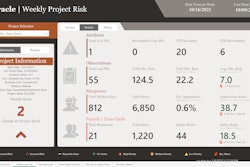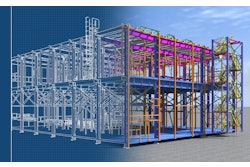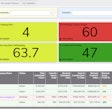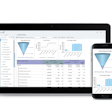
Sage, which has a global position in construction enterprise resource planning (ERP) and other software to small and mid-sized business (SMB)-sized contractors has expanded its construction cloud suite well beyond financials to preconstruction and construction management.
Sage does go to market with independent software vendor (ISV) partners, but this is not a partner solution, and the announcement was foreshadowed by its May 2023 acquisition of construction management software vendor Corecon. The launch of Sage Construction Management adds cloud preconstruction and project management capabilities to its portfolio of Sage Intacct Construction, Sage 100 Contractor and Sage 300 Construction and Real Estate.
“Sage is proud to offer the only true cloud solutions built for construction with full end-to-end capabilities covering preconstruction, operations, and financials,” Sage Vice President of Product for Construction and Real Estate Julie Adams said. “Sage has been an industry leader at the forefront of innovation for more than 50 years. The addition of Sage Construction Management further strengthens the depth and breadth of Sage’s construction portfolio and fills an industry need for comprehensive cloud-based solutions that fit the requirements and budgets of smaller contractors and can scale to support their needs as they grow.”
Sage Construction Management is a cloud-native solution, so it naturally supports collaboration and mobility so field, office, and external teams can share real-time project information for decision support and transparency. The solution is offered together with Sage Intacct Construction Financials as an end-to-end suite that enables operational and finance teams to align and work together towards improved job profitability.
“In researching project management solutions, it was clear that this was the package for us,” Mid-Atlantic Building Services Office Manager Shawn Peterson, said. “It can take us from the first subcontractor proposal, through the last pay app to the client. And with everything in one platform, everyone can access what they need in their own individual capacities without being disjointed.”
Sage is also offering the Construction Essentials package, which includes Sage Construction Management and Sage Intacct Construction Financials as an end-to-end suite at a cost-effective price for growing contractors. In addition, Sage Construction Management is available as a standalone preconstruction and project management solution with connectors to other accounting solutions, providing businesses the power and flexibility to choose the mix of solutions that best addresses their needs.
IRONPROS caught up with Sage’s Adams for a through briefing on the new product and what it means for contractors evaluating construction business software.
IRONPROS: So, to begin with, is this net new sales part that will carry its own subscription costs? Or is this something that's bundled in with Intacct or with the other Sage ERP products?
ADAMS: We’re really excited about how we're bringing this together. Sage Construction Management, together with Intacct Construction Financials, is bundled together as one end-to-end solution that covers precon, operations, project management, financials and accounting. It's all one bundle. When you buy Sage Intacct for construction, you get the whole solution footprint, and then buy as many users as you need—how many project management users you have, that's how many user licenses you buy.
Now, the other thing to note here, is that there is project manager functionality in in the previous Sage Intacct core financials for construction. There's a project management user license there, and when you buy what we're now calling a construction management user license, you are entitled to all the functionality in our new construction management module, as well as all of the functionality that existed previously within the Intacct Construction Financials solution footprint.
IRONPROS: Okay, so would that be would that kind of cut both ways so, if you've got the project management user license in Intacct, you then also get the construction management user license?
ADAMS: Now, it's really the CM user license that is the all-encompassing type of user. And by the way, all construction customers going forward, not retroactively but going forward, will be buying construction management licenses versus project management licenses.
IRONPROS: With this new functionality, what's the relationship between this and the functionality that came with the Corecon acquisition?
ADAMS: It is basically Corecon that enabled us to get to this point at a rapid pace. We took our Corecon acquisition, and we added to it, we invested in it, and we built out the tighter integration with all of the other assets that we have at Sage. And then we brought the user interface together. So, Corecon is the foundation of what we've what we've been able to do.
IRONPROS: Will this also extend the on-premise cloud-enabled solutions like Sage 100 Contractor and Sage 300 Construction and Real Estate?
ADAMS: That is part of some exciting new offerings that will be coming. The construction management functionality is sold together with Intacct Construction Financials as an end-to-end suite. Additionally, we're taking construction management, and we're, we're enabling that to be sold standalone. It already integrates with QuickBooks. It integrates with Xero, it integrates with Sage 50 Canada. We're building out integration with Sage 100 Contractor, as well as Sage 300 Construction and Real Estate. And honestly, we already have about 100 customers who are using Sage Construction Management together with these solutions, but it's not yet fully integrated. When the integration is made available, they're going to take it to the next level. And then of course, a bunch of the existing customer base is going to want to take advantage of construction management as well.
Stream our IRONPROS Product Snapshot of Sage's construction ERP solutions.
IRONPROS: Let me throw some things out there a little bit more tactical and market oriented.
There are construction ERP products, and you may see products from Oracle or NetSuite, Microsoft or, various other broad ERP solutions extended, often by independent software vendor (ISV) solutions, for construction. They may also have an integration with Procore to really take it beyond the accounting and maybe project financial controls into more the operational phase of the project. Where do you think this puts Sage in that equation of being able to be a solution that goes deeper into the project with no external partners?
ADAMS: That's what it's all about. It is a purpose built, end-to-end born-in-the-cloud solution for construction. So, it isn't horizontal stuff. And then, we can still put a bunch of ISV partners to kind of take it to that last mile. But even then, they are still working with Sage. And the reason why this is important is because what we're hearing from customers is that it is great that there is so much choice out there. There are all these great things that they can choose from. But what they're also finding is that it's challenging to deal with the complexity of all these different vendors and, and then putting things together. And so there, they really would like an all-in-one solution from a single vendor of choice. We intend that to be sage. Now being saying that, we're going to have that all in one end-to end-solution for construction but we're also 100% committed to being an open platform, because it isn't about one size fits all.
Other customers will want to use other solutions. There are all kinds of innovations that are happening out there in the ISP space. And so of course, what we want to do is provide that all in one solution, and then enable our customers to pick the right combination, that's going to work the best for them. So Procore, for example, is a is a key partner for Sage. We have a strong relationship. We have a lot of mutual customers, and we intend to continue to be strong partners. Yes, we have some operational capabilities. But like Procore, if you're a $500 million GC, Procore may be the best solution for you. And then you can use Procore together with Sage, and it's the right thing for the customer. So, at the end of the day, it's all about making sure that the customer is armed with the solution that's going to be optimal for them.
IRONPROS: You seem to see Procore as a solution for larger contractors. Procore is in kind of an interesting position, because they'll say, they’re a premium product, you know, but still pursue that broad network effect and have everybody on it. I think your point about well, gee, if you're like a $500 million GC, that premium product at a certain price point may be attractive is interesting. How much further down market so you think that this combined solution can go then then Procore? And what do you think the cost equation is going to be? How do you think that's going to be different?
ADAMS: Well, as I mentioned, Sage construction management already is sold into the very low end of the market. It integrates with QuickBooks, for example, and Xero. It goes all the way down—put it that way—to the to the smallest construction customers that need a solution. And then, it continues to be there when you are graduating from QuickBooks—when QuickBooks just isn't enough for you anymore. So that's when you start to look at construction management together with Intacct Construction Financials together as a solution. Which kind of to takes you to that next level. We are in small and midsize businesses. And it's not just for the QuickBooks graduates—we have customers that are much larger and are even public. So, it really depends on the specific customer. But our sweet spot is mid-market and all the way down.
IRONPROS: That’s super important because we've seen so many of the enterprise software providers pursuing just the largest deals with the largest contractors. That might make sense given the fact that that large sale may take only a little more up-front work than a much smaller one. What options do you have for people to buy direct from Sage, or from resellers who might already have a relationship with them? Or will there be something we're not seeing a lot of in this space—online subscription sales through e-commerce, which brings its own problems for adoption.
ADAMS: The way that we're going to market today is through partners—value-added resellers (VARs). That is our primary channel. We also have a direct sales capability that we're building up for construction management as a standalone solution, going to the lower end of the market for QuickBooks grads and selling construction management integrated with QuickBooks and Xero. And then in the mid-market, it's really about leveraging our very strong existing VAR channel, to basically not only expand within our installed base, but also the combination of construction management within tech construction financials.
In terms of like the whole digital ecommerce self-serve, we are thinking about it, honestly. And we believe it will be most appropriate and we will have the first initial success at the very, very low end, like the QuickBooks and Xero audience because they buy QuickBooks and Xero online. If they are looking at construction management solutions, having a similar all-digital experience, may fit with how they like to buy things.
IRONPROS: So, let me hit you with one more big wide-open question, then I'll throw the floor open to you to fill in the blanks or anything you don't think we've really addressed that would be interest of that organization going through a construction software consideration cycle. But if you're looking at the level of effort required by a contractor to get up to speed, and implement and begin realizing value from the construction management solution, what does that process and timeline look like typically?
ADAMS: We actually have kind of packaged implementation services for Sage Construction Management. At the low end, it's five hours. And if you want kind of the full Monty, it's, 15 hours of approximate time to get the thing implemented. So that hopefully gives you a sense that it's not months. But a lot of it in terms of length, duration and success is really how committed the customer is to getting it implemented, deployed and adopted.
IRONPROS: So, what types of things have we not really discussed yet that you think are really important to contractors doing due diligence on Sage Construction Management?
ADAMS: I don't think I talked about the Essentials package yet. As I said, Sage Construction Management together with Sage Intacct Construction Financials is now being sold together as an end-to-end suite, just full stop.
However, we also are taking that end-to-end suite and packaging together and created what we call the Essentials Edition for construction. And what that does is create that end-to-end package. But we are including things like training and custom reporting capabilities. And it all comes together as just one all in one bundle targeted at specifically at those QuickBooks graduates. So, you've outgrown QuickBooks, and now, you want to take advantage of construction management together with construction financials. The Essentials package is really designed for them, and it is at a very, very low price point so that they can get started. Now as they grow, you know, the idea is that they grow and then they expand with the solution, and kind of become a mainstream customer as they grow.
BOTTOM LINE: Sage is demonstrating its commitment to construction, and not just the major contractors that turn the head of many ERP vendors, but the middle market. By adding broad, SaaS-based project management to a modern, multi-tenant SaaS-based construction financials and ERP, Sage offers a broad construction software footprint affordably while helping contractors avoid cloud sprawl and the attendant multiple vendor agreements that must be managed and code lines that must be integrated. As Sage Construction Management integrates with Sage 100 Contractor and Sage 300 Construction and Real Estate, these ERP products as well as Quickbooks will become more viable for contractors who recognize the pressing need to digitize their back office.















